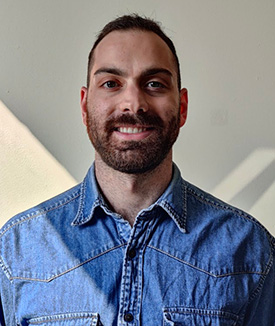║┌┴¤│ď╣¤═°doctoral graduates Joseph Bedard and Tari Ajadi have been named the 2024 recipients of the ║┌┴¤│ď╣¤═°Doctoral Thesis Awards, an annual honour that recognizes dissertations that have made significant and original contributions to the academic community and Canadian society.
The awards, presented by the Faculty of Graduate Studies for more than 25 years now, recognize exceptional theses submitted by PhD students.
Dr. BedardÔÇÖs ground-breaking research in the Department of Chemistry centered on making plastics out of nitrogen and phosphorus. He hopes his work lays the foundation for the development and commercialization of atmospheric nitrogen-derived plastics, but also that it challenges basic assumptions in the way chemicals that can be used as building blocks for synthetic materials are identified.
ÔÇťJoe took on the most ambitious project in our group with global impact and systematically developed the tools needed to tackle it,ÔÇŁ says Dr. Saurabh Chitnis, who served as his doctoral supervisor. ÔÇťHis curiosity, enthusiasm, and persistence are models for all graduate students undertaking high-risk, high-reward research. I am thrilled to see it recognized in this way and to have been part of his scientific journey.ÔÇŁ┬á
Dr. Bedard was also recently crowned the winner of Falling Walls Lab Pitches competition in Berlin, Germany, for his presentation ÔÇťBreaking the Wall of Alternative Plastics.ÔÇŁ
Dr. AjadiÔÇÖs thesis sheds light on the remarkable efforts of African Nova Scotian community organizations and activists in shaping policies related to health and policing, historically and in the present. He hopes his work informs future attempts at transformational change that will and are currently unfolding by chronicling some of the successes (and failures) of the past. The work also pushes back against the erasure of Black political organizing in contemporary discussions around Canadian politics.
"TariÔÇÖs research on African Nova Scotian activism in policing and public health is path-breaking in the field of Canadian political science,ÔÇŁ says Dr. Kristin Good, his former supervisor in the Department of Political Science.
ÔÇťHis work is conceptually and methodologically innovative in its exploration of African Nova ScotiansÔÇÖ long history of resistance to structural racism and of community organizing in Halifax, conceptualizing its organizations and networks as part of a competing racial order united by a commitment to self-determination and driven by an ethic of care. Methodologically, his work breaks new ground by including autoethnography as part of his toolkit, which allows him to reflect upon his personal experience as an activist in the analysis. I learned a lot from supervising TariÔÇÖs thesis and look forward to following his academic career.ÔÇŁ
As this yearÔÇÖs winners, Drs. Bedard and Ajadi will also be DalÔÇÖs nominees for the CAGS-ProQuest Distinguished Dissertation Award, which will be awarded by the Canadian Association for Graduate Studies (CAGS) later this year.
For more insights into their impactful work, explore the Q&A below.
Dr. Joseph Bedard, Chemistry PhD
 Can you briefly summarize your doctoral thesis?
Can you briefly summarize your doctoral thesis?
My thesis is concerned with making synthetic polymers (i.e. plastics) out of nitrogen and phosphorus. Right now, about 85% of the plastics we make are derived from petrochemicals. As our society is shifting away from fossil fuels towards alternative energy sources, we also must consider alternative materials sources as well. The work in my thesis is an entrant into the arena of non-petroleum-based plastics. I discovered a way to convert chemicals, derived from the nitrogen in our atmosphere, into polymers and networks with an incredibly unique molecular structure (nitrogen and phosphorus cages), the likes of which had not been discovered before. My thesis details the exploration of the fundamental properties for these new materials, as well as the physical properties of the plastics I can make from them. 
What impact do you hope to make with your research?
My hope is that the work I have done during my PhD not only lays the groundwork for the development and commercialization of atmospheric nitrogen-derived plastics, but also really encourages a paradigm shift in terms of the way we identify the chemicals that can be used as building blocks for synthetic materials. From a more zoomed-in perspective, I'm looking forward to seeing the chemistry research community build further on the concept of stringing together molecular cages to make polymers, and ultimately, materials. 
Tell me about a defining moment you had at Dalhousie.
In the fourth year of my PhD, through the encouragement of my principal investigator, prof. Saurabh Chitnis, I entered a regional competition called Falling Walls Lab Atlantic. I did not know too much about it at the time, but as I prepared my 3-minute pitch for the competition, I was encouraged to really think about the potential societal impact of my research. It is not often that synthetic chemists working on innovative, fundamental projects think about our work on such a scale. Doing so allowed me to realize that my research was actually a lot closer to having a material impact on our society than I'd thought. I went on to finish runner-up in the Atlantic competition and got a chance to go to Berlin to compete in the international competition, which I was lucky enough to end up winning. 
What are you doing now?
Right now, I have moved to Montreal, where I have traded the Maritime fog for the city smog (Willy's poutine holds up pretty well!). I am currently exploring opportunities that align best with my expertise and passion for chemistry and "big bet" science.
Dr. Tari Ajadi, Political Science PhD
 Can you briefly summarize your doctoral thesis? 
Can you briefly summarize your doctoral thesis? 
My doctoral thesis is about the incredible work that African Nova Scotian community organizations and activists do (and have done, historically) to transform policy related to health and policing. It argues that Black organizers in Halifax engage in ÔÇťworldmakingÔÇŁ via centuries-long lineage of resistance, institution-building, and advocacy. This worldmaking moves towards the idea of self-determination: being able to decide for oneself the trajectory of oneÔÇÖs community. As part of this lineage, organizers foster a distinct political identity that can facilitate solidarity across difference despite the significant barriers they may face in transforming the status quo.
What impact do you hope to make with your research?
I hope to inform future attempts at transformational change that will and are currently unfolding by chronicling some of the successes (and failures) of the past. I also intend to push back against the erasure of Black political organizing in contemporary discussions around Canadian politics.
Tell me about a defining moment you had at Dalhousie.
The defining moments of my time at ║┌┴¤│ď╣¤═°were the everyday acts of kindness and care that my close friends and mentors showed me throughout the years I spent at DalÔÇô these moments have shaped who I am today.┬á
What are you doing now? 
I am an Assistant Professor in Black Politics at McGill University.

